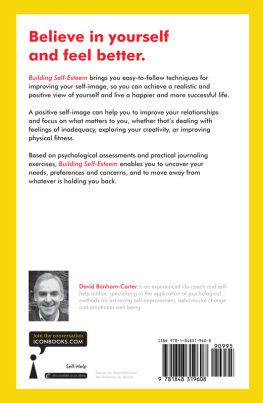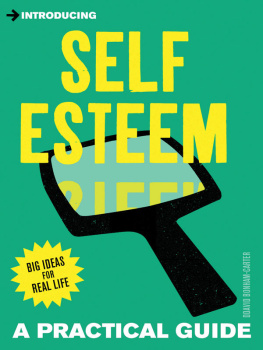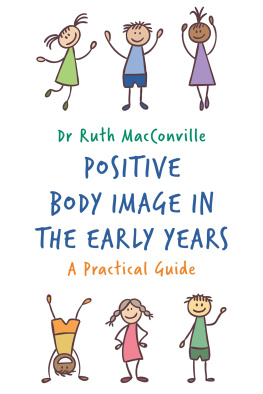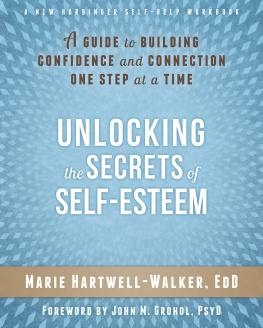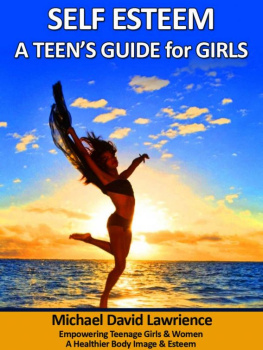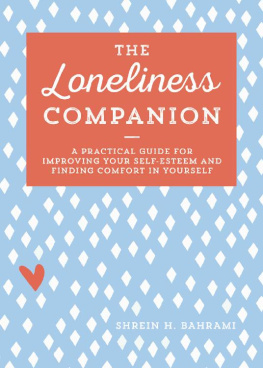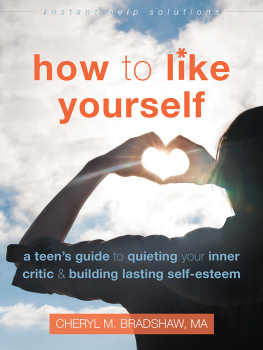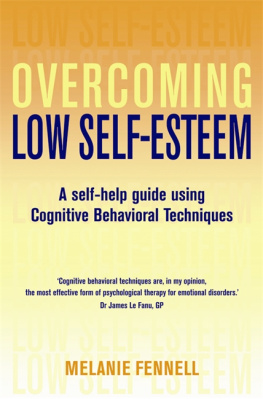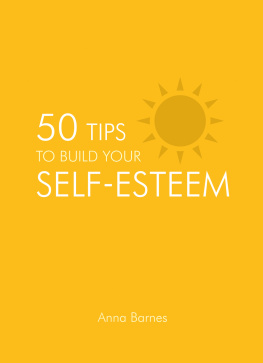BUILDING
SELF-ESTEEM
David Bonham-Carter
BUILDING
SELF-ESTEEM
A FIVE-POINT PLAN
FOR VALUING YOURSELF MORE

Published in the UK in 2016 by
Icon Books Ltd, Omnibus Business Centre,
3941 North Road, London N7 9DP
email:
www.iconbooks.com
First published in the UK in 2012 by Icon Books Ltd
Sold in the UK, Europe and Asia
by Faber & Faber Ltd, Bloomsbury House,
7477 Great Russell Street,
London WC1B 3DA or their agents
Distributed in the UK, Europe and Asia
by Grantham Book Services,
Trent Road, Grantham NG31 7XQ
Distributed in Australia and New Zealand
by Allen & Unwin Pty Ltd,
PO Box 8500, 83 Alexander Street,
Crows Nest, NSW 2065
Distributed in South Africa by
Jonathan Ball, Office B4, The District,
41 Sir Lowry Road, Woodstock 7925
Distributed in India by Penguin Books India,
7th Floor, Infinity Tower C, DLF Cyber City,
Gurgaon 122002, Haryana
Distributed in Canada by Publishers Group Canada,
76 Stafford Street, Unit 300
Toronto, Ontario M6J 2S1
Distributed in the USA
by Publishers Group West
1700 Fourth St., Berkeley, CA, 94710
ISBN: 978-184831-960-8
Text copyright 2012 David Bonham-Carter
The author has asserted his moral rights
No part of this book may be reproduced in any form, or by any means, without prior permission in writing from the publisher.
Typeset in Adobe Caslon by Marie Doherty
Printed and bound in the UK by Clays Ltd, St Ives plc
About the author
David Bonham-Carter is a life coach and writer on self-help topics who specializes in helping people struggling with self-esteem, anxiety, assertiveness and related difficulties. For many years David worked in the UK as a social worker helping people from a range of backgrounds to achieve positive changes in their lives through face-to-face work before setting up his own life coaching practice in Bristol. He has a Masters Degree in Social Work from the University of Kent (passed with distinction) and a Masters Degree in Philosophy from the University of Bristol. He has a particular interest in the use of cognitive behavioural therapy (CBT) techniques for helping people to develop self-esteem and assertiveness skills and he has written a number of guides to dealing with particular emotional and cognitive difficulties. More information about his life coaching service and his practical self-help guides is available at his website: www.davidbonham-carter.com.
David would like to thank Denise for her incisive and helpful comments on the first draft of the book.
It is the mind that maketh good or ill, That maketh wretch or happy, rich or poor.
Edmund Spenser,
The Faerie Queene, Book VI, Canto IX
Building Self-Esteem includes practical ideas and exercises to help people struggling with self-esteem issues. The techniques and ideas in the book are likely to be of benefit to many people making use of them. They are provided in good faith on the basis of the authors research and professional experience as a life coach. However, it is not claimed that they will be appropriate for all individuals at all times nor are they intended as a substitute for medical advice where that is required. You are advised to exercise your own reasonable judgement about what is suitable in your particular situation and to seek appropriate independent professional advice if you are unsure about what is best for you in your situation or if your issues are such that you may need further help.
Introduction:
The journey to self-esteem
SELF-ESTEEM AND ATTITUDES TO THE SELF
As human beings we make judgements all the time about the world we live in, the situations we are involved in and the people we come into contact with. If you have low self-esteem you make negative judgements about yourself much of the time. You feel that you are not good enough or that you do not act well enough. Self-esteem is therefore intimately connected with self-perception and goes to the core of your identity. In this book I aim to present you with some helpful ideas on self-esteem and dealing with negative thoughts about yourself, in a format that is informative and practical.
Different traditions and cultures have produced their own accounts of self-consciousness and desirable attitudes to take towards the self: the Chinese sage Lao Tzu counselled in the Tao Te Ching that mastering the self requires strength, the ancient Greek philosopher Socrates urged: Know thyself, and Ren Descartes ushered in modern Western philosophy with the famous observation I think therefore I am. Ideas from Hindu and Buddhist philosophical approaches and meditation techniques for observing yourself or letting go of thoughts have also been adapted by recent American and British self-help authors to help with self-esteem and other issues.
A NEW APPROACH TO SELF-ESTEEM A FIVE-POINT PLAN
To provide a new approach to self-esteem that is easy to follow, I have separated out the aspects of developing self-esteem into five key points, or ingredients, each of which has a chapter devoted to it. Together the first letters of each of the five key ingredients combine to form the word VALUE:
Value yourself
Accept yourself
Look after yourself
Understand yourself
Empower yourself
Chapter 1 on valuing yourself covers techniques that you can use for building a positive self-image and techniques for countering limiting beliefs that may be inhibiting you from developing your potential.
Chapter 2 on accepting yourself covers techniques that you can use to help you develop an attitude of self-acceptance, both in putting negative thoughts about yourself in particular situations in perspective and in dealing with an overall sense of inadequacy, if that is something you experience.
Chapter 3 on looking after yourself considers an area which is sometimes undervalued in discussions of self-esteem that of taking good care of your mind and body. This is important because your mental and physical health are often intimately connected.
In chapter 4 on understanding yourself I start by examining potential causes of low self-esteem and move from there into illustrating how you can develop your own understanding and awareness of yourself, your identity and your personality in healthy ways that help to address negative voices from your past or present.
Chapter 5 on empowering yourself brings you forward into the arena of developing your assertiveness and improving related communication skills in relationships.
The books conclusion then provides you with suggestions as to how you can build on the most relevant parts of what you have learned from the VALUE acronym by developing it into a purposeful plan for you to use.
A PRACTICAL PLAN FOR BUILDING SELF-ESTEEM
The book is written as a practical guide. In each chapter I provide tips for you to follow and exercises to try out to help you develop the aspect of self-esteem that is being discussed. I also provide case studies to illustrate how individuals in particular situations might apply the techniques. In compiling the case studies I have drawn on my professional experience as a life coach working with people around self-esteem, as well as on my own personal experience and relationships. The people in the case studies are not real individuals, but their dilemmas and efforts reflect concerns and approaches that are common among people that I have worked with or know.
Next page
